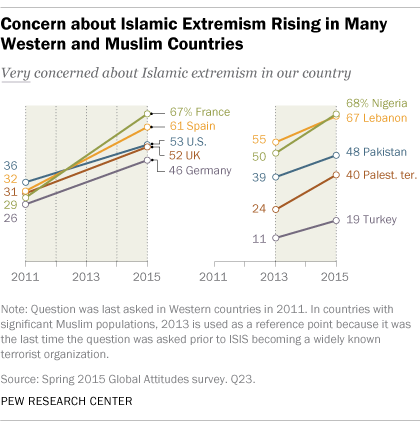
As the Islamic militant group ISIS continues to entrench itself in Syria and Iraq, and instigate terrorist attacks around the world, concerns about Islamic extremism are growing in the West and in countries with significant Muslim populations. Since 2011, the percentage saying they are very concerned about Islamic extremism in their country has increased 38 percentage points in France, 29 points in Spain, 21 points in the United Kingdom, 20 points in Germany and 17 points in the United States.
Concerns are also up significantly in Nigeria (+18), the Palestinian territories (+16), Lebanon (+12), Pakistan (+9) and Turkey (+8) since 2013, before ISIS became widely known.

People in Israel (37% very concerned) and Russia (23%) are less concerned about extremism than those in many of the other countries surveyed. But this has not always been the case in Russia, where great concern about extremism is down 12 percentage points since 2011 and 29 points since 2005, when the survey was fielded just months after 334 hostages died in a school in Beslan that was taken over by Chechen rebels.
In the U.S., these demographic differences also extend to political party and religion. Republicans and Americans who say religion is important are more likely to be concerned about Islamic extremism than are Democrats and independents, and those who say religion is not important to their daily lives.
Additionally, general concern about extremism in these countries is closely associated with worries about the international reach of ISIS. In 20 of the 21 the countries surveyed, people who are very concerned about the ISIS threat in Iraq and Syria are significantly more worried about the extremist threat in general. (For more on global views of ISIS as an international concern, see here).
These are among the main findings of a new Pew Research Center survey, conducted in 21 nations among 21,235 respondents from April 5 to May 21, 2015.
Concerns about Extremism High in France and Spain
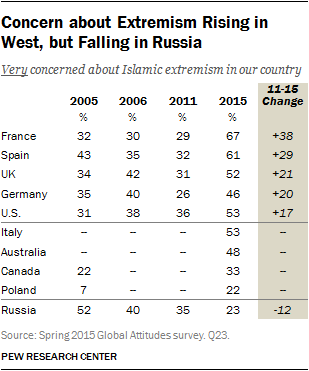
Concern is also high in Spain, where 61% are very worried about the extremist threat.
Roughly half in the U.S. (53%), Italy (53%) and UK (52%) are very apprehensive about extremism in their countries. Among Americans and Brits, this represents around a 20-percentage-point increase in concern since 2011. Meanwhile, 46% of Germans are very concerned, up 20 points from 2011.
Australians, though a world away from the Islamic State’s territory, have also experienced a terrorist attack in the past year, when a hostage standoff in Sydney ended in the death of three people, including the gunman. Roughly half in Australia (48%) are very concerned about Islamic extremism in their country.
Only a third of Canadians are very worried about the extremist threat in Canada, despite the 2014 attack at the Canadian National War Memorial in Ottawa.
In Russia, just 23% are very concerned about extremism. This is down 12 points since 2011 and 29 points from 2005. Similarly, in Poland, only 22% are very concerned about the threat of Islamic extremism.
Older and Conservative Europeans Worried about Islamic Threat
Across all the European countries surveyed, as well as in Australia, Canada and Russia, older people are more concerned than younger generations about the threat of Islamic extremism. For example, a majority of Germans ages 50 and older are very concerned about extremism in their country (56%), while only 22% of those ages 18-29 concur. Large age gaps are also found in the UK (older are +31 points higher), Australia (+27), Canada (+26), Spain (+23) and France (+20).

Women are more concerned than men about Islamic extremism in many of the Western countries surveyed. Two-thirds of Spanish women are very concerned about the extremist threat, while only 54% of men say the same. A similar gap appears in Italy (women are +13 points higher), and significant differences by gender are also found in France (+9), Germany (+8), Australia (+7) and Canada (+6).
Additionally, in four of the six European countries surveyed, those on the ideological right are more worried about the Islamic threat in their country compared with the left. In Germany, 55% of those who describe themselves as on the right of the ideological scale say they are very concerned about Islamic extremism in their country, while only a third on the left agree. Significant right-left gaps also appear in France (those on right are +21 higher), the UK (+19) and Spain (+9).
Republicans and Older People in U.S. Highly Concerned about Extremism
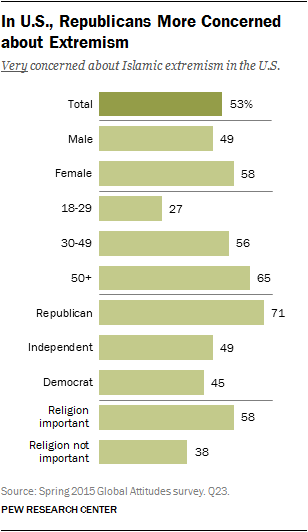
In the U.S., women, older Americans, Republicans and those who say religion is important in their lives are the most likely to be very concerned about Islamic extremism.
For instance, 58% of American women are very worried about the extremist threat in the U.S., while only 49% of men agree.
Additionally, 58% of Americans who say religion is very or somewhat important in their lives are very concerned about Islamic extremism, while only 38% among those who say religion is less important agree.
Nigerians and Lebanese Most Concerned about Extremism
Among the countries surveyed with significant Muslim populations, Nigerians (68%) and Lebanese (67%) are the most concerned about Islamic extremism in their country.
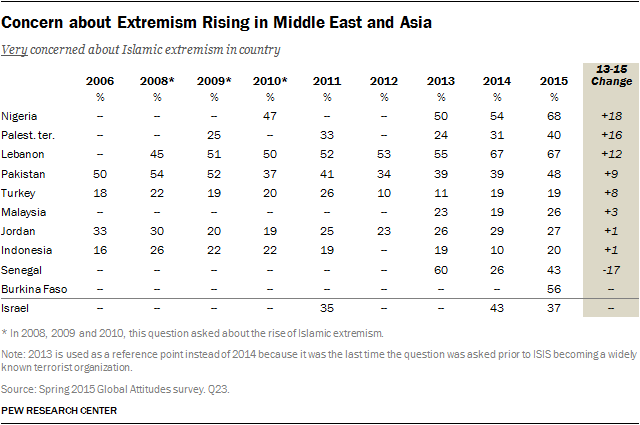
In Nigeria, which recently completed a changeover in power to the new president Muhammadu Buhari and is dealing with the Boko Haram terrorist group, which recently pledged to ally itself with ISIS, concerns are up 18 percentage points since 2013. Nigerian Christians (73%) are somewhat more likely than Muslims (63%) to be very concerned about extremists.
Four-in-ten Palestinians are very worried about the extremist threat, up 16 points since 2013. Israelis are about as worried (37%), though concerns about the extremist threat have gone down slightly in the last year (-6 points). Only about a quarter of Jordanians (27%) share this concern.
Concerns about Islamic extremism are somewhat more muted in Turkey (19%). Yet it borders Syria and Iraq and has experienced terrorist incidents in Istanbul in the past year, which might help explain the 8-point rise in fears about the threat since 2013.
In Africa, a majority of those in Burkina Faso (56%) are very worried about extremism, and this worry is shared by Christians and Muslims alike. In Senegal, the share of people who are very concerned fluctuated from 60% in 2013, when there was an imminent threat from extremists in neighboring Mali, to 26% in 2014, before Islamic State established itself in the area, back to 43% in 2015, when violence from extremist groups such as Boko Haram increased across the region.
In Southeast Asia, few in Malaysia (26%) and Indonesia (20%) are very worried about the terrorist threat, though more Malaysian Muslims (30%) are very concerned than Buddhist Malays (18%).
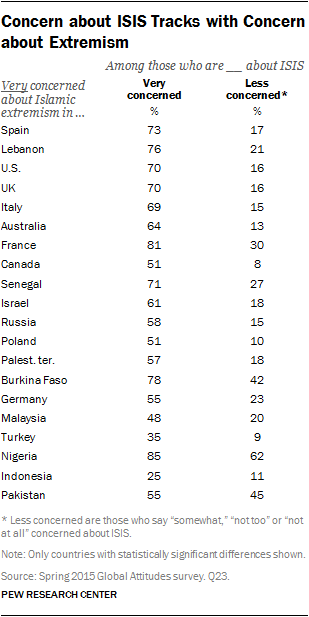
In general, there are few variations on concern about extremism by age and gender within these countries.
Fears of ISIS Associated with General Concerns about Extremism
For example, when asked a separate question about international worries over the Islamic militant group in Iraq and Syria, among those Spaniards who are very concerned about ISIS, 73% are very concerned about Islamic extremism in their country, while only 17% who are less concerned about ISIS agree (a 56 percentage point difference). In Lebanon, it is a 55 point difference (76% vs. 21%).
Differences of over 50 percentage points are especially common in Western nations, including 54 points in the U.S., UK and Italy.




